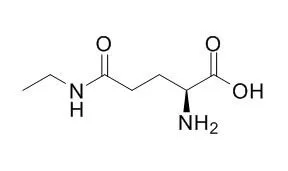| In vivo: |
| Hum Exp Toxicol. 2016 Feb;35(2):135-46. | | l-Theanine prevents carbon tetrachloride-induced liver fibrosis via inhibition of nuclear factor κB and down-regulation of transforming growth factor β and connective tissue growth factor.[Pubmed: 25852135] | Here we evaluated the ability of L-Theanine in preventing experimental hepatic cirrhosis and investigated the roles of nuclear factor-κB (NF-κB) activation as well as transforming growth factor β (TGF-β) and connective tissue growth factor (CTGF) regulation.
METHODS AND RESULTS:
Experimental hepatic cirrhosis was established by the administration of carbon tetrachloride (CCl4) to rats (0.4 g/kg, intraperitoneally, three times per week, for 8 weeks), and at the same time, adding L-Theanine (8.0 mg/kg) to the drinking water. Rats had ad libitum access to water and food throughout the treatment period. CCl4 treatment promoted NF-κB activation and increased the expression of both TGF-β and CTGF. CCl4 increased the serum activities of alanine aminotransferase and γ-glutamyl transpeptidase and the degree of lipid peroxidation, and it also induced a decrease in the glutathione and glutathione disulfide ratio. L-Theanine prevented increased expression of NF-κB and down-regulated the pro-inflammatory (interleukin (IL)-1β and IL-6) and profibrotic (TGF-β and CTGF) cytokines. Furthermore, the levels of messenger RNA encoding these proteins decreased in agreement with the expression levels. L-Theanine promoted the expression of the anti-inflammatory cytokine IL-10 and the fibrolytic enzyme metalloproteinase-13. Liver hydroxyproline contents and histopathological analysis demonstrated the anti-fibrotic effect of L-Theanine.
CONCLUSIONS:
In conclusion, L-Theanine prevents CCl4-induced experimental hepatic cirrhosis in rats by blocking the main pro-inflammatory and pro-fibrogenic signals. | | Acta Neuropsychiatr. 2015 Apr 21:1-6. | | Effect of l-theanine on glutamatergic function in patients with schizophrenia.[Pubmed: 25896423] | Glutamatergic dysfunction in the brain has been implicated in the pathophysiology of schizophrenia. Previous studies suggested that L-Theanine affects the glutamatergic neurotransmission and ameliorates symptoms in patients with schizophrenia. The aims of the present study were twofold: to examine the possible effects of L-Theanine on symptoms in chronic schizophrenia patients and to evaluate the changes in chemical mediators, including glutamate + glutamine (Glx), in the brain by using 1H magnetic resonance spectroscopy (MRS).
METHODS AND RESULTS:
The subjects were 17 patients with schizophrenia and 22 age- and sex-matched healthy subjects. L-Theanine (250 mg/day) was added to the patients' ongoing antipsychotic treatment for 8 weeks. The outcome measures were the Positive and Negative Syndrome Scale (PANSS), Pittsburgh Sleep Quality Index scores and MRS results.
There were significant improvements in the PANSS positive scale and sleep quality after the L-Theanine treatment. As for MRS, we found no significant differences in Glx levels before and after the 8 week L-Theanine treatment. However, significant correlations were observed between baseline density of Glx and change in Glx density by L-Theanine.
CONCLUSIONS:
Our results suggest that L-Theanine is effective in ameliorating positive symptoms and sleep quality in schizophrenia. The MRS findings suggest that L-Theanine stabilises the glutamatergic concentration in the brain, which is a possible mechanism underlying the therapeutic effect. | | J Nat Med. 2014 Oct;68(4):699-708. | | L-Theanine healed NSAID-induced gastric ulcer by modulating pro/antioxidant balance in gastric ulcer margin.[Pubmed: 24981317] | L-Theanine is a unique non-protein-forming amino acid present in tea [Camellia sinensis (L.) O. Kuntze]. In the present work, we evaluated the healing effect of L-Theanine on NSAID (indomethacin)-induced gastric ulcer.
METHODS AND RESULTS:
Histology of the stomach tissues revealed maximum ulceration on the third day after indomethacin administration (18 mg/kg, single dose p.o.) which was accompanied by increased lipid peroxidation; protein carbonylation; Th1 cytokine synthesis, and depletion of thiol, mucin, prostaglandin (PG) E, Th2 cytokine synthesis; and total antioxidant status in mice. L-Theanine healed gastric ulcer at a dose of 10 mg/kg b.w. but aggravated the ulcerated condition at a higher dose of 40 mg/kg b.w. At 10 mg/kg b.w., L-Theanine significantly alleviated the adverse oxidative effect of indomethacin through enhanced synthesis of PGE2 by modulation of cyclo-oxygenase-1 and 2 [COX-1 and COX-2] expression, Th1/Th2 cytokine balance, and restoration of cellular antioxidant status at the gastric ulcer margin.
CONCLUSIONS:
The present study revealed for the first time the dose-dependent biphasic effect of a natural neuroprotective agent, L-Theanine, on gastric ulcer disease. |
|






 Cell. 2018 Jan 11;172(1-2):249-261.e12. doi: 10.1016/j.cell.2017.12.019.IF=36.216(2019)
Cell. 2018 Jan 11;172(1-2):249-261.e12. doi: 10.1016/j.cell.2017.12.019.IF=36.216(2019) Cell Metab. 2020 Mar 3;31(3):534-548.e5. doi: 10.1016/j.cmet.2020.01.002.IF=22.415(2019)
Cell Metab. 2020 Mar 3;31(3):534-548.e5. doi: 10.1016/j.cmet.2020.01.002.IF=22.415(2019) Mol Cell. 2017 Nov 16;68(4):673-685.e6. doi: 10.1016/j.molcel.2017.10.022.IF=14.548(2019)
Mol Cell. 2017 Nov 16;68(4):673-685.e6. doi: 10.1016/j.molcel.2017.10.022.IF=14.548(2019)